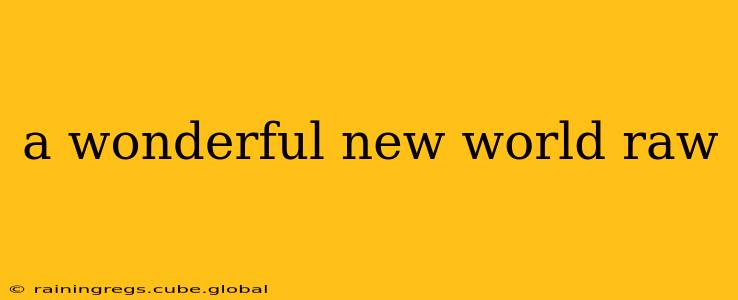A Wonderful New World: A Raw Look at Huxley's Dystopian Masterpiece
Aldous Huxley's Brave New World, published in 1932, remains chillingly relevant today. Far from a simple dystopian cautionary tale, it's a complex exploration of societal control, technological advancement, and the very nature of happiness. This examination delves into the raw, unsettling aspects of Huxley's vision, moving beyond the surface-level interpretations to explore the deeper anxieties it reflects.
What is the main idea of Brave New World?
The central theme revolves around the dangers of unchecked technological progress and societal engineering. Huxley paints a picture of a seemingly utopian future, where stability is achieved through genetic manipulation, social conditioning, and the pervasive use of pleasure-inducing drugs like Soma. However, this stability comes at the cost of individual freedom, genuine emotion, and meaningful human connection. The novel argues that a superficial happiness, devoid of genuine struggle and self-discovery, is ultimately a form of enslavement. The World State's control is so complete that its citizens are blissfully unaware of their own oppression.
What are the different social classes in Brave New World?
Huxley's World State is rigidly stratified into five castes: Alphas, Betas, Gammas, Deltas, and Epsilons. These castes are predetermined genetically and conditioned from birth to accept their assigned roles in society. Alphas are the intellectual elite, while Epsilons are the lowest caste, performing menial labor. This rigid hierarchy ensures social stability but also stifles individual potential and creates profound inequalities. The conditioning process ensures each caste accepts its place without question, effectively eliminating social unrest.
What is the significance of Bokanovsky's Process and Podsnap's Technique?
Bokanovsky's Process is a method of human cloning, enabling the mass production of identical individuals within a caste. Podsnap's Technique accelerates the maturation process, further streamlining the production of the World State's workforce. These techniques are central to the World State's control, ensuring a predictable and easily managed population. They represent the ultimate dehumanization of individuals, reducing them to mere cogs in a vast, impersonal machine.
How does Soma function in Brave New World?
Soma is a powerful drug that provides instant gratification and eliminates negative emotions. It acts as a social control mechanism, ensuring the population remains docile and content. While offering temporary escape from the anxieties of life, Soma ultimately prevents individuals from confronting their problems or striving for personal growth. The widespread use of Soma demonstrates the World State's preference for superficial happiness over genuine well-being.
What is the significance of John the Savage's character?
John, raised outside the World State on a reservation, represents a stark contrast to the conditioned citizens. He embodies the romantic ideals of love, art, and individual freedom, which are absent in the World State. His struggle to reconcile his values with the World State's reality highlights the inherent flaws of a society built on artificial happiness and social control. John's tragic demise underscores the incompatibility between individual expression and a totalitarian regime.
Is Brave New World a warning about technology?
While technology is instrumental in creating the World State's oppressive system, Brave New World is not simply a condemnation of technological advancement. It's a warning about the potential misuse of technology, and the dangers of prioritizing efficiency and control over human dignity and individual freedom. The novel prompts a crucial examination of our own relationship with technology and its impact on our society.
What are the criticisms of Brave New World?
Some critics argue that Huxley's vision is overly simplistic, neglecting the complexities of human nature and societal evolution. Others contend that the World State's success is predicated on a level of technological advancement that remains unrealistic. However, the novel's enduring power lies in its ability to spark debate and critical reflection on the ethical implications of societal control and technological progress. The questions it raises remain as pertinent today as they were in 1932.
This analysis provides a deeper understanding of Brave New World's complexities. While seemingly utopian on the surface, Huxley’s vision offers a raw and unflinching look at the potential consequences of sacrificing individual freedom for social stability. The novel’s enduring legacy lies in its capacity to provoke critical thought and challenge our assumptions about happiness, technology, and the nature of a truly “wonderful” world.
